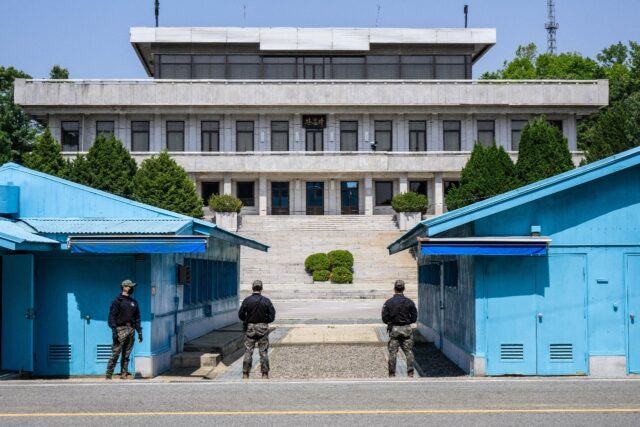A US soldier is believed to have been detained by North Korea after crossing the heavily fortified border — an incident likely to further aggravate Washington’s troubled relations with the nuclear-armed state.
Hours later, North Korea fired two short-range ballistic missiles into the sea, according to the South Korean military — an apparent response to the first visit by an American nuclear-armed submarine to a South Korean port in decades.
The events underscored the diplomatic tightrope being walked by Seoul and Washington in the face of an increasingly assertive Pyongyang.
The soldier — identified by the US military as Travis King, a private second class who has been in the army since 2021 — crossed the border “willfully and without authorization,” US Forces Korea spokesman Colonel Isaac Taylor said.
The United Nations Command said he had been on a Joint Security Area (JSA) orientation tour, adding that he was believed to be in North Korean custody and that it is working with Pyongyang’s military to “resolve this incident”.
Pentagon chief Lloyd Austin told journalists that Washington was “closely monitoring and investigating the situation and working to notify the soldier’s next of kin”.
CBS News, citing US officials, reported that the low-ranking soldier was being escorted home to the United States for disciplinary reasons, but managed to leave the airport and join the tour group.
North and South Korea remain technically at war since the 1950-1953 Korean War ended with an armistice, rather than a peace treaty, with a Demilitarised Zone running along the border.
Soldiers from both sides face off at the JSA north of Seoul, which is overseen by the United Nations Command.
It is also a popular tourist destination and hundreds of visitors tour on the South Korean side every day.
Former US president Donald Trump met North Korean leader Kim Jong Un at the Panmunjom Truce Village in 2019 and even stood on North Korean soil by stepping across the demarcation line there.
Panmunjom is “the only location one could attempt such a move out of the whole JSA tour,” Choi Gi-il, a professor of military studies at Sangji University, told AFP.
An eyewitness who said they were on the same tour told CBS News the group had visited one of the buildings at the site when “this man gives out a loud ‘ha ha ha’ and just runs in between some buildings”.
“I thought it was a bad joke at first but, when he didn’t come back, I realised it wasn’t a joke and then everybody reacted and things got crazy,” they said.
No North Korean soldiers
North Korea sealed its borders at the start of the Covid-19 pandemic in 2020 and has yet to reopen them. Its security presence on its side of the border at the JSA has also been scaled back significantly.
When AFP toured the JSA earlier this year, no North Korean guards were visible in the area. Even so, under armistice protocols, South Korean or US personnel could not run across the border to retrieve the US national.
Retired US Army lieutenant colonel Steve Tharp, who worked in the JSA area, told Seoul-based specialist site NK News he had no idea how the North Koreans would react to the incident.
“This is the first contact since Covid… We don’t know what they’re thinking,” he told NK News.
The incident comes as relations between the two Koreas are at one of their lowest points, with diplomacy stalled and Kim calling for increased weapons development, including tactical nuclear weapons.
Seoul and Washington have ramped up defence cooperation in response, staging joint military exercises with advanced stealth jets and US strategic assets.
Nuclear sub
The allies held the first Nuclear Consultative Group meeting in Seoul on Tuesday and announced an American nuclear submarine was making a port visit to Busan for the first time since 1981.
Pyongyang, which baulks at having US nuclear assets deployed around the Korean peninsula, then fired two short-range ballistic missiles into the East Sea, also known as the Sea of Japan, South Korea’s Yonhap news agency reported.
South Korea’s Joint Chiefs of Staff called the launches “acts of significant provocation,” the report said.
The JSA in Panmunjom is typically peaceful despite ongoing hostility between the two sides.
In 1976, two American soldiers were killed in the JSA by North Koreans with axes in a dispute over a tree.
The last time there was a defection at the JSA was in 2017, when a North Korean soldier drove a military jeep and then ran on foot across the demarcation line at Panmunjom.
He was shot multiple times by his fellow North Korean soldiers but survived.
In general, defections between the two Koreas are rare but far more common in the other direction, when North Koreans seek to escape grinding poverty and repression by fleeing, typically across the northern land border into China.

COMMENTS
Please let us know if you're having issues with commenting.